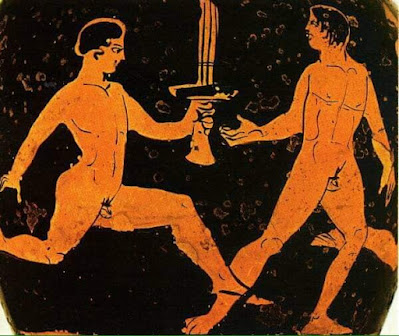ΟΛΥΜΠΙΑΚΟΙ ΑΓΩΝΕΣ-ΠΙΝΔΑΡΟΣ
ΟΛΥΜΠΙΑΚΟΙ ΑΓΩΝΕΣ~OLYMPIC GAMES
"ΜΗΔ' ΟΛΥΜΠΙΑΣ ΑΓΩΝΑ ΦΕΡΤΕΡΟΝ ΑΥΔΑΣΟΜΕΝ"
Πίνδαρος
... nor any contest than the Olympian greater to sing.
Pindar
(Greek & English text)
Από όλους τους πανελλήνιους αγώνες στην αρχαία Ελλάδα οι σημαντικότεροι διεξάγονταν στην Ολυμπία.
«Όπως το νερό είναι το πολυτιμότερο από τα στοιχεία, και όπως ο χρυσός προβάλλει σαν το πιο ακριβό ανάμεσα σε όλα τα αγαθά, και όπως, τέλος, ο ήλιος φωτοβολεί περισσότερο από κάθε άλλο άστρο, έτσι και η Ολυμπία λάμπει σκιάζοντας κάθε άλλον αγώνα» τραγουδά ο Πίνδαρος στην πρώτη ολυμπιακή ωδή του.
Σύμφωνα με την παράδοση, πρώτοι οι θεοί αγωνίστηκαν στην Ολυμπία. Ο Δίας νίκησε τον Κρόνο στην πάλη, ο Απόλλωνας τον Ερμή στο δρόμο και τον Άρη στην πυγμή. Επίσης οι αρχαίες πηγές αναφέρουν αρκετούς ήρωες ως ιδρυτές των αγώνων.
Η ίδρυση των αγώνων, αποδίδεται στον ημίθεο Ηρακλή, ο οποίος ιδρύει τους αγώνες δρόμου αλλά και τις αρματοδρομίες. Ο Ηρακλής είναι εκείνος που έφερε την αγριελιά από τη χώρα των Υπερβορείων, τη φύτεψε στο Ιερό, και καθόρισε τα όρια της ιεράς άλτης.
Οι αρχαίες γραπτές πηγές αναφέρουν ως έτος έναρξης των αγώνων το 776 π.Χ. Από το έτος αυτό αρχίζει και ο κατάλογος των Ολυμπιονικών (που συμπληρώθηκε βέβαια πολύ αργότερα).
Τον 5ο αι. π.Χ. οι αγώνες έφτασαν στο απόγειο της δόξας τους. Στην ελληνιστική εποχή όμως, έχασαν τον αρχικό τους χαρακτήρα και μετατράπηκαν σε επαγγελματικές αθλητικές εκδηλώσεις κάτι που παγιώθηκε στη ρωμαϊκή εποχή. Τελικά, καταργήθηκαν από το Θεοδόσιο Α΄ το 393 μ.Χ. (293η Ολυμπιάδα), όταν με διάταγμά του απαγορεύθηκε η λειτουργία όλων των Αρχαίων Ιερών.
Με τους Ολυμπιακούς αγώνες σφυρηλατήθηκε η εθνική, φυλετική και πνευματική ενότητα των Ελλήνων. Οι αγώνες συνδύαζαν το βαθύ θρησκευτικό πνεύμα με το ηρωικό παρελθόν των Ελλήνων, τον μέγιστο βαθμό της καλλιέργειας του σώματος, του νου και της ψυχής με τις πανανθρώπινες φιλοσοφικές αξίες και την προβολή του ατόμου και των πόλεων με το ύψιστο αγαθό της Ελευθερίας.
According to tradition, the Olympic Games began in 776 B.C. when Ifitos made a treaty with Lycourgos the king and famous legislator of Sparta and Cleisthenes the king of Pissa. The text of the treaty was written on a disc and kept in the Heraion. In this treaty that was the decisive event for the developement of the sanctuary as a Panhellenic centre, the "sacred truce" was agreed. That is to say the ceasing of fighting in all of the Greek world for as long as the Olympic Games were on. As a reward for the victors, the cotinus, which was a wreath made from a branch of wild olive tree that was growing next to the opisthodomus of the temple of Zeus in the sacred Altis, was established after an order of the Delphic oracle.
The Olympics were held, after the completion of four years during the month of July or August. The time inbetween two Olympic Games was called an Olympiad. In the beginning the games lasted only one day and comprised of only one event, the running of one Stadion, but gradually more events were added resulting, towards the 5th century B.C., in the games lasting for 5 days.
In total the Olympic Games consisted of 10 events: running, the pentathlon, jumping, discus, "ekebolon" javelin, wrestling, boxing, the pancration, chariot racing, and horse racing.
All Greeks who were free citizens and had not committed murder or heresy, had the right to take part in the Olympic Games. Women were not entitled to take part, except as owners in the horse races, while being strictly prohibited from watching the games.
The athletes presented themselves one month before the games began at Elis, the organising town, but the organisation and supervision for the upholding of the rules was carried out by the Hellanodikes, who were chosen by lot from the citizens of Elis. Two days after the beginning of the games, the procession of the athletes and the judges started from Elis to arrive in Olympia where it was received by the crowds who had come to watch the games. The ceremonies began with the official oath that was taken by the athletes at the altar of Horkios Zeus, in the Bouleuterion, swearing that they would compete with honour and respect the rules. The victors enjoyed great honours and on returning to their cities their compatriots pulled down part of the walls for them to enter. They were also given special privileges and high office.
The institution of the Olympic Games lasted for twelve continuous centuries and was abolished in 393 A.D. (the 293rd Olympiad) by order of Theodosios I when the functioning of all ancient worshiping sanctuaries was forbidden.
The national, racial and spiritual unity of the Greeks was forged thanks to the Olympic Games. The Olympic Games combined the deep religious spirit along with the heroic past of the Greeks thus unifying to the highest degree body, mind and soul according to universal and philosophical values, and so projecting the indivdual as well as the cities, through the highest ideal of freedom.
ΣΟΦΙΑ ΣΙΔΗΡΟΠΟΥΛΟΥ
ΜΟΝΟΔΡΟΜΟΣ Η ΕΝΩΣΗ ΟΛΩΝ ΤΩΝ ΕΛΛΗΝΩΝ
ΣΤΟ ΔΙΚΟ ΤΟΥΣ ΠΟΛΙΤΙΚΟ ΦΟΡΕΑ ΕΚΠΡΟΣΩΠΙΣΗΣ ΤΟΥ ΕΘΝΟΥΣ
ΕΛΛΗΝΩΝ ΣΥΝΕΛΕΥΣΙΣ
ΑΡΧΙΚΗ - ΠΡΟΦΙΛ ΑΡΤΕΜΗ ΣΩΡΡΑ: http://www.artemis-sorras.gr
ΠΡΟΤΑΣΗ 600 ΔΙΣ: http://600dis.oramaellas.gr
ΠΡΟΤΑΣΕΙΣ ΔΗΜΩΝ: http://dimoi.oramaellas.gr
ΤΡΑΠΕΖΑ ΤΗΣ ΑΝΑΤΟΛΗΣ: http://trapeza-anatolis.oramaellas.gr
ΠΡΟΤΑΣΗ ΤΧΣ: http://txs.oramaellas.gr
ΗΛΕΚΤΡΟΝΙΚΗ ΕΦΗΜΕΡΙΔΑ ΕΛΛΗΝΩΝ ΣΥΝΕΛΕΥΣΙΣ:
ΠΟΛΙΤΙΚΟΣ ΦΟΡΕΑΣ ΤΟΥ ΕΛΛΗΝΙΚΟΥ ΕΘΝΟΥΣ
ΙΔΡΥΤΙΚΗ ΔΙΑΚΗΡΥΞΗ:
ΚΑΤΑΣΤΑΤΙΚΟ:
ΠΡΟΓΡΑΜΜΑΤΙΚΕΣ ΔΗΛΩΣΕΙΣ:
ΕΙΔΗΣΕΟΓΡΑΦΙΚΟ SITE ΕΛΛΗΝΩΝ ΣΥΝΕΛΕΥΣΙΣ:
ΑΠΟΛΟΓΗΤΙΚΟ ΥΠΟΜΝΗΜΑ ΤΟΥ ΑΡΤΕΜΗ ΣΩΡΡΑ:
ΑΙΘΕΡΙΚΗ ΓΡΑΦΗ: https://www.aitherikigrafi.gr/
ΓΡΑΦΕΙΑ ΕΛΛΗΝΩΝ ΣΥΝΕΛΕΥΣΙΣ Ε.ΣΥ. ΣΕ ΕΛΛΑΔΑ ΚΑΙ ΕΞΩΤΕΡΙΚΟ:
Η Ε.ΣΥ. ΛΑΡΙΣΑΙΩΝ 3 - ΧΡΥΣΟΧΟΟΥ 3-5, ΛΑΡΙΣΑ, ΤΗΛ. 2411117889











.png)
Δεν υπάρχουν σχόλια